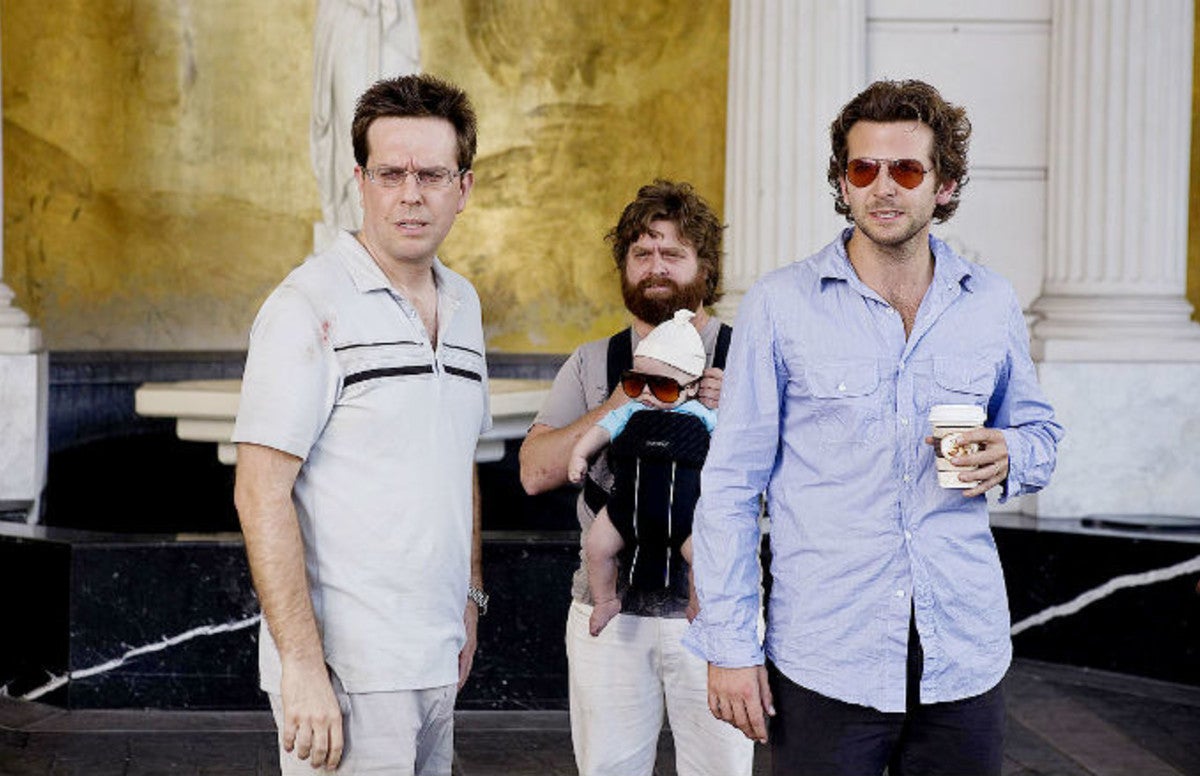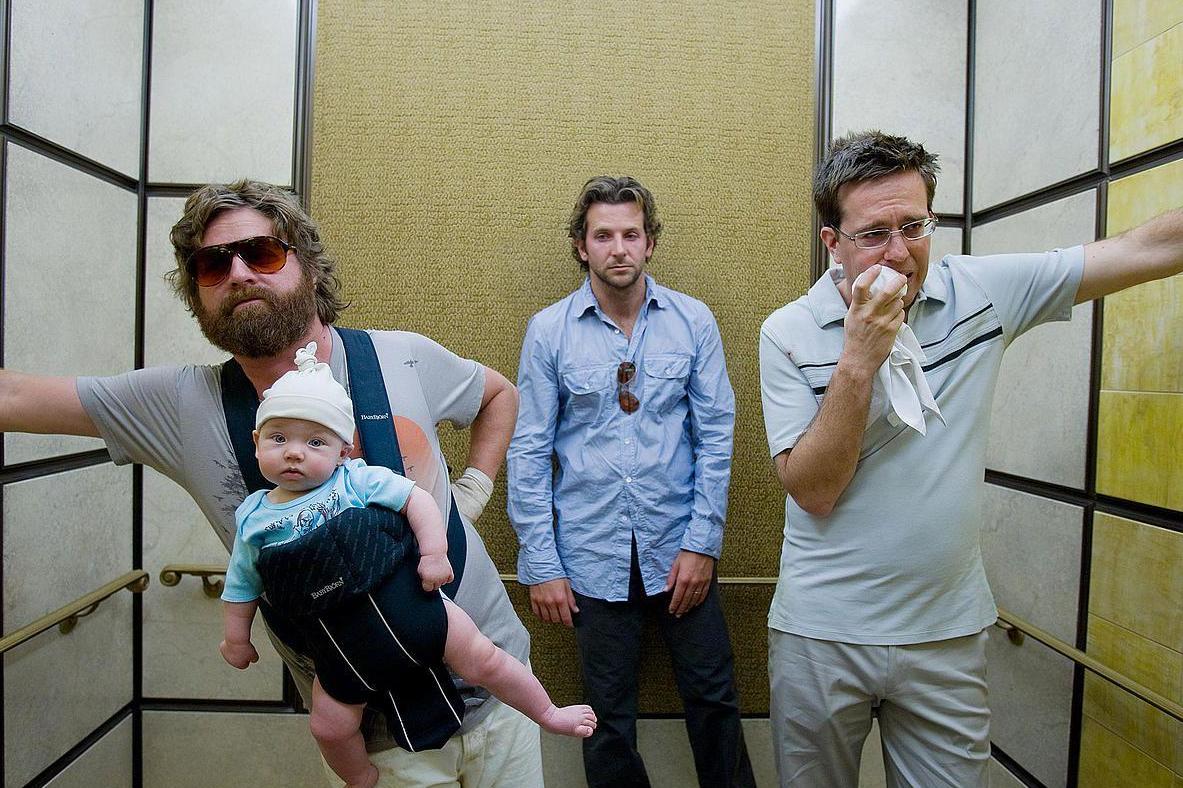Your support helps us to tell the story
From reproductive rights to climate change to Big Tech, The Independent is on the ground when the story is developing. Whether it's investigating the financials of Elon Musk's pro-Trump PAC or producing our latest documentary, 'The A Word', which shines a light on the American women fighting for reproductive rights, we know how important it is to parse out the facts from the messaging.
At such a critical moment in US history, we need reporters on the ground. Your donation allows us to keep sending journalists to speak to both sides of the story.
The Independent is trusted by Americans across the entire political spectrum. And unlike many other quality news outlets, we choose not to lock Americans out of our reporting and analysis with paywalls. We believe quality journalism should be available to everyone, paid for by those who can afford it.
Your support makes all the difference.Which joke from The Hangover has aged the worst? The one where Bradley Cooper’s creepy alpha party dude Phil refers to Ed Helms’s dentist Stu as “Doctor Faggot?” Zach Galifianakis pretending the baby he’s toting around is performing a lewd act? The use of the date-rape drug Rohypnol as a major plot point? Take a ticket and get in line.
There are films that only in hindsight can be appreciated for the works of genius that they are. And there are movies that make absolutely no sense outside their immediate context. But has a box office smash from the recent past ever weathered the years more horrifically than Todd Phillips’ $600m blockbuster, which, incredibly, turns a mere decade old this month?
The Hangover was certainly regarded as unpleasant in the moment, it should be acknowledged. This “caper” in which four chums go to Las Vegas for a bachelor party and become entangled in a blurry, drug-fuelled mystery was heavily reproached as a knuckle-dragging dead end. Critics despaired of its juvenility, its glorification of boys-will-be-boys dissoluteness, the shrugging sexism and racism.
Most problematic of all, of course, was scriptwriters Jon Lucas and Scott Moore’s message that within every boring, middle-aged dude resides an unreconstructed frat boy waiting to burst free. All it takes is rooftop cocktails with his bros and a run-in with Mike Tyson to unlock the shackles.
Still, even with all of that in mind, watching The Hangover today, in the age of #MeToo, I’m amazed it managed to slouch its way onto the screen.
Consider the motley crew in whose company we pass the 108-minute running time. Cooper’s Phil, as pointed out above, is toxic masculinity poured into a suit and pasted with stubble. Helms’s Doctor Stu is a warning to men everywhere what happens when they are gentle and considerate – they are taken advantage of by a horrible, shrill (unfaithful) girlfriend (Rachael Harris).
Galifianakis’s loveable (ish) weirdo Alan, it is true, doesn’t do or say much offensive on screen (apart from the thing with the baby) Nonetheless, he is presented as a convicted sex offender – a designation obviously played for laughs. “I’m not supposed to be within two hundred feet of a school… or a Chuck E Cheese,” he explains. Clutch your sides and try not to fall over from the hilarity.

Then there is the cameo by Mike Tyson. In 1992 – a long time ago, but not that long a time ago – Tyson was convicted of rape, for which he received a six-year sentence. But in 2009, The Hangover had no issues with him popping up for a delightful cameo. The filmmakers had been in Las Vegas on a research mission, when they randomly stumbled upon the former heavyweight champion. Their first thought was that they really needed him in their picture.
“Before we started shooting, we were in Vegas, and we went to some cheesy club in Caesars Palace,” recalled Justin Bartha, who played boring groom character Doug (no you probably don’t remember him – Doug is missing for most of the film).

Watch Apple TV+ free for 7 days
New subscribers only. £8.99/mo. after free trial. Plan auto-renews until cancelled

Watch Apple TV+ free for 7 days
New subscribers only. £8.99/mo. after free trial. Plan auto-renews until cancelled
“Zach and I were like, ‘Let’s go out to [singer and rapper] Nick Cannon‘s birthday party [at the club].’ Mike Tyson was there, and I was like: ‘Oh my God. This is our chance.’ We were going to work with him.”

Tyson appears not to have properly grasped what he was signing up for, as he would later explain to The Hollywood Reporter. “They said, ‘We’re going to be shooting a movie with you in two weeks.’ I didn’t even know. I said, ‘Really?!’ and I started drinking with them. I was a little wasted at the time. I still didn’t understand the movie until like a week and a half later, when I was on set with these guys.”
In the film, Tyson (in which he played a tiger-owning parody of himself) can, in hindsight, be seen as the shuttering of an era. Soon, celebrities with a problematic past would no longer be able to carry on regardless. Galifianakis is, for instance, rumoured to have vetoed a Tyson-style appearance from Mel Gibson in 2011’s The Hangover Part II. Yet, in a behind-the-scenes making-of video for the original, he comes across cheerfully blithe about Tyson’s participation. “He’s got that chequered past,” Galifianakis shrugs. “But I really like him. I thought he was really sweet.”
The Hangover started life as ”It Happened In Vegas”. Producer Chris Bender had an apocryphal story he liked to share about a friend who had vanished on a weekend in Sin City, leaving behind a huge bill from a strip club. His friends had to piece together what happened with the stripper’s docket as starting point (the pal later turned up alive and well). Starting there, fledgling scriptwriters Lucas and Moore grafted a bawdy comedy to a whodunnit chassis.
What if the central mystery revolved around that first wild night in Las Vegas, and the characters were required to walk backwards through a trail of clues: the baby in the cupboard, Mike Tyson’s tiger in the penthouse loo etc?
Moore and Lucas pitched the idea to New Line Cinema in 2007. The executives loved it – but only if they could proceed with the What Happens In Vegas title. When that named proved difficult to secure, New Line passed. Undeterred, Moore and Lucas wrote the script anyway and sent it to their agents CAA. They handed it over to another client, comedy director Todd Phillips.
Phillips was going through a rough patch. His 2004 Starsky and Hutch remake bombed horribly. And he’d left Borat after clashing with Sacha Baron Cohen. In Moore and Lucas’s script – the film was now called “The Hangover” – he saw a shot at redemption.
“I brought it to Jeff Robinov at Warner Bros, and said: ‘Look, here’s this movie,’” he recalled. “The thing that was there was that these guys lost the groom and couldn’t remember what they did. That was all there.”
Warners was on board. However, the studio insisted on slashing the budget. Phillips’s $6.5m directing fee was deemed especially problematic. He agreed to work practically for nothing, on the agreement that he would receive a cut of any profits. The deal would eventually be worth $70m to him.
Multiple script revisions followed. Yet, the version of The Hangover that made it to the screen was still extraordinarily rudimentary in many aspects. Its stance on gender and race seems to come from another time and place – one considerably more distant than 2009. All the female characters are, for instance, either shrews or strippers (the latter embodied by Heather Graham as a dancer with a heart of gold).
Aside from Tyson, the only black character is a drug dealer. And then we have Ken Jeong‘s Mr Chow. Jeong, a well-regarded comedian, has credited the part of a camp Asian man with helping him through his wife’s chemotherapy. But that hardly excuses Mr Chow’s adherence to the sorriest stereotypes.
“Ken Jeong as a prancing, lisping Asian gangster known as Mr Chow,” wrote Jezebel. “[He]… is decked out in flimsy air quotes to make it seem as if the movie is making fun of racism.”
All of these issues with The Hangover were perfectly obvious on its release. Yet there was no backlash – at least not at first – no sense that hooting along with Mike Tyson or laughing as Phil put down Stu’s girlfriend as a shrill monster was boorish and ugly.
To this day, its Rotten Tomatoes audience approval rating stands at a stonking 84 per cent. Reviewers got behind it too, with the Los Angeles Times praising its “perverse brilliance” and even The Independent finding something to like (“Some very funny, very non-PC dialogue is thrown about like a game of catch. The actors, virtually unknown, are terrific”.)?
The good news, though, is that The Hangover was not the beginning of something, but the end. Comedy in the preceding decade and a half had been dominated by lowest-denominator gross-outs. From American Pie to Old School via Dumb and Dumber, the tone was puerile and matter-of-factly sexist (and often racist too). With The Hangover, these traits came together in one toxic pyre of bromantic fear and loathing.
Two sequels would prove equally successful, it’s true. Nevertheless, it quickly became obvious that times had moved on. The cast more or less disowned the follow-ups. Cooper, the original’s breakout actor, was soon throwing puppy eyes at Jennifer Lawrence in Silver Linings Playbook and turning Lady Gaga into the Barbra Streisand of her generation with A Star Is Born.
And when female-centric Bridesmaids became a hit in 2011, there was a sense audiences were at last ready for bawdy chuckles that flowed from a non-douchey dude perspective. The Hangover had lumbered big screen comedy with a killer headache. Ten years on, the happy twist is that, despite stomping all over the box office like a football hooligan, it has, with hindsight, left almost no legacy at all.

Join our commenting forum
Join thought-provoking conversations, follow other Independent readers and see their replies
Comments